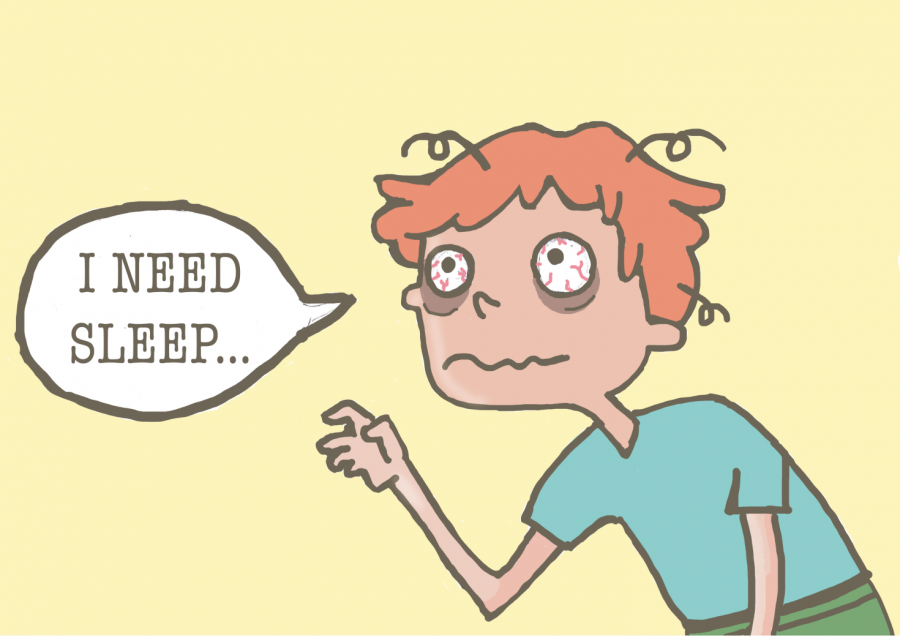Sleep Deprivation: A major issue?
February 4, 2021
If you’ve ever spent a night tossing and turning, you already know how you’ll feel the next day: tired, cranky, and out of sorts. But missing out on the recommended 7 to 9 hours of shut-eye does more than make you feel groggy and grumpy. It has long term implications.
It drains your mental abilities and puts your physical health at risk. Science has linked ‘poor slumber’ with a number of health problems, from weight gain, to a weakened immune system.
Ernest Hemingway once remarked, “I love sleep. My life has a tendency to fall apart when I’m awake.” Whether you have it all together during the day or resonate more so with Hemingway, we all benefit from healthy sleep habits. Sleep promotes cognition and memory, facilitates learning, recharges our mental and physical batteries, and generally helps us make the most out of our days. With plentiful sleep, we improve our mental and physical health, reduce stress, and maintain the routine that is critical to healthy daily functioning.
For high school students, Sleep is often the first thing to go when trying to squeeze in all of the academic, social, and extracurricular activities that are often part of our life. And when you’re taking online classes remotely, you may find yourself catching up on asynchronous course content at any hour of day or night while the rest of the household sleeps. So why is it important to maintain healthy sleep habits?
Sleep plays a critical role in helping our bodies and minds recover and rejuvenate. As a result, sleep contributes to improvements in learning and promotes regulatory functions such as emotional and behavioral control that are important for each and every day. According to (Sleep foundation, 2020), some examples of physiological and behavioral benefits of sleep include: improving our ability to learn new information and form memories, and assisting in optimal emotional control, decision making, and social interaction.
Because sleep plays such a crucial role in human functioning, lack of sleep can lead to a number of consequences affecting behaviour, memory, emotions and learning. When we do not get the sleep we need, our bodies don’t forget; we go into sleep debt. Our bodies continue to pay back this debt by trying to sleep whenever possible, resulting in microsleeps. Have you ever noticed some inadvertent sleeping during the day (even in class or when studying) that can just last seconds? These microsleeps impede concentration and negatively impact retention of information.
Additionally, individuals often use caffeine or other stimulants to stay awake. This not only puts them at risk because of the consequences of poor sleep, but also the negative effects of caffeine usage.
Given what we know about sleep, there are a number of things you can do and avoid to improve your sleep cycle. This list is not exhaustive, but it includes many suggestions that help in falling and staying asleep so you can get the 7-9 hours your body and mind need.
THINGS YOU MAY WANT TO TRY
- Allow yourself enough time to sleep.
- Gradually set earlier bedtimes when attempting to adjust your sleep cycle.
- Expose yourself to bright light in the morning to help wake up.
- Keep your bedroom cool, dark, and quiet to help fall asleep.
- Exercise regularly but not right before bed.
- Maintain a regular sleep routine on weekdays and weekends.
- Relax yourself as much as possible before bed. This can include taking a warm bath, meditating, or reading something that is not cognitively taxing.
- Re-evaluate your daily schedule and make time for 7-9 hours of sleep every night.
- Prioritize and protect your sleep time. Find a friend who can help keep you accountable for going to sleep at your goal bedtime each night.
- Structure your day and plan ahead on your exams, assignments, due dates, and activities so that you don’t have to end up cramming or working at night. Use a weekly calendar and/or a priorities list to help take control of your to do lists and better manage your time to prioritize sleep.
- Make an appointment with an academic coach to talk one-on-one about your schedule, sleep habits, and study habits and how to manage your time to prioritize sleep.
THINGS YOU MIGHT WANT TO CUT OUT
- Don’t eat large meals right before bed.
- Don’t engage in rigorous exercise before bed.
- Don’t drink caffeine within 8hrs of your intended bedtime.
- Don’t expose yourself to bright lights before going to bed.
- Don’t use electronic devices that give off light such as TV, computer, phones, etc. before bed. This light inhibits the secretion of melatonin making it more difficult to fall asleep.
Overall, the teenage years are a formative period. The brain and body experience significant development, and the transition to adulthood brings important changes that affect emotions, personality, social and family life, and academics.
Sleep is essential during this time, working behind the scenes to allow us to be at our best. So don’t cut time for sleep, it’s what helps us be our best selves.
